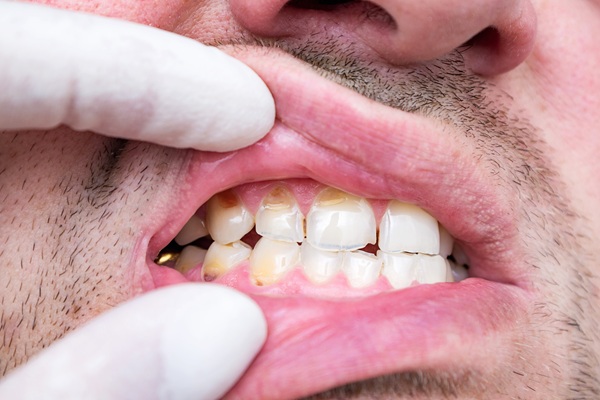The Danger of Untreated Gum Disease

Gum disease is a serious oral health condition that can lead to severe health issues when left untreated. This condition, also known as periodontal disease, affects the gums and supporting structures of the teeth. Without the appropriate treatment, gum disease can lead to tooth loss, oral infections, and an increased risk of systemic health issues.
The progression of gum disease
The earliest stage of gum disease begins with gingivitis. This condition occurs when there is plaque buildup along the patient's gumline, causing inflammation, redness, and bleeding. Gingivitis is reversible with good oral hygiene practices and regular dental cleanings. However, if left untreated, it can progress to periodontitis, a more severe form of gum disease.
Periodontitis leads to the destruction of gum tissue and the underlying bone structure that supports the teeth. As the condition worsens, pockets form between the teeth and gums, allowing bacteria to accumulate and spread to other parts of the mouth. Over time, this can result in loose teeth and eventual tooth loss. Once gum disease reaches an advanced stage, the patient needs professional intervention to prevent further deterioration.
Signs and symptoms of gum disease
Recognizing the early signs of gingivitis and gum disease is essential for patients to get the treatment they need as soon as possible. Common symptoms include:
- Red, swollen, or bleeding gums
- Persistent bad breath (halitosis)
- Gum recession or teeth appearing longer
- Loose or shifting teeth
- Pain or discomfort when chewing
Ignoring these symptoms can worsen the underlying cause of the gum disease and make it harder to treat. As the condition progresses, it may lead to serious health issues and require more complex treatments, increasing the cost of care and affecting the patient's recovery.
The link between gum disease and systemic health complications
Untreated gum disease is a concern for oral health and a risk factor for several systemic health conditions. Research has shown a strong connection between gum disease and cardiovascular disease. According to a 2021 article by Harvard Health, people with gum disease have two to three times the risk of having a heart attack, stroke, or other serious cardiovascular event. While there is no known direct connection, researchers believe that the bacteria associated with periodontal infections can enter the bloodstream, contributing to inflammation and increasing the risk of heart disease and stroke.
Diabetes is another condition linked to gum disease. Individuals with diabetes are more susceptible to infections, including periodontal disease. Severe gum disease can make it harder to control blood sugar levels. This creates a harmful cycle that worsens both gum disease and blood sugar issues.
Additionally, bacteria from the mouth can be inhaled into the lungs, potentially leading to pneumonia and other respiratory complications. Pregnant individuals with untreated gum disease may also face an increased risk of premature birth and low birth weight.
Protect your health against gum disease
Untreated gum disease can affect more than your smile. Without the appropriate treatment, it can lead to serious systemic health complications. Recognizing the early signs of gum disease can help prevent irreversible damage. Protect your health against gum disease and schedule an appointment at our Marietta office today.
Request an appointment here: https://www.mariettadentalsmiles.com or call Marietta Dental Smiles at (770) 200-4988 for an appointment in our Marietta office.
Check out what others are saying about our dental services on Yelp: Gum Disease in Marietta, GA.
Related Posts
Are you wondering whether you can do anything to prevent gum disease? According to the Centers for Disease Control and Prevention (CDC), gum disease affects over half of all Americans over the age of 30.Early stages of gum disease, such as gingivitis, may be treated with a dental cleaning every six months and good oral…
Gum disease, also commonly referred to as periodontal disease, is an inflammation of the gums. It is caused by plaque, which is a sticky, colorless film of bacteria that often forms on teeth. Gum disease usually causes tooth loss. It is often painless, so you may not even know you have it. Fortunately, gum disease…
A cosmetic dentist often hears concerns about whitening discomfort and can explain why sensitivity sometimes increases during treatment. Whitening products lift stains by allowing active ingredients to move through enamel, which can temporarily irritate the tooth's inner structures. Understanding what causes sensitivity and how to reduce it helps patients pursue a brighter smile more comfortably.Whitening…
Patients often search for root canal treatment when a tooth aches from deep decay, a crack, or inflamed pulp tissue. This therapy removes irritated nerve tissue, disinfects the canal space, and seals the tooth to prevent reinfection. By preserving the natural root, the procedure maintains bite balance and chewing strength. With careful planning, a restored…
